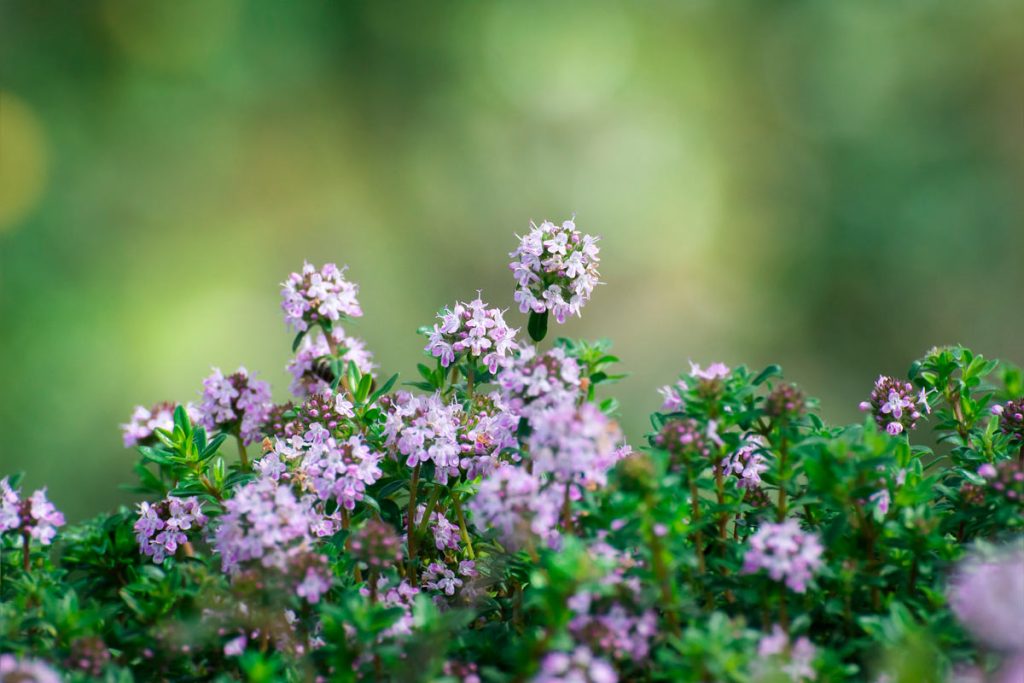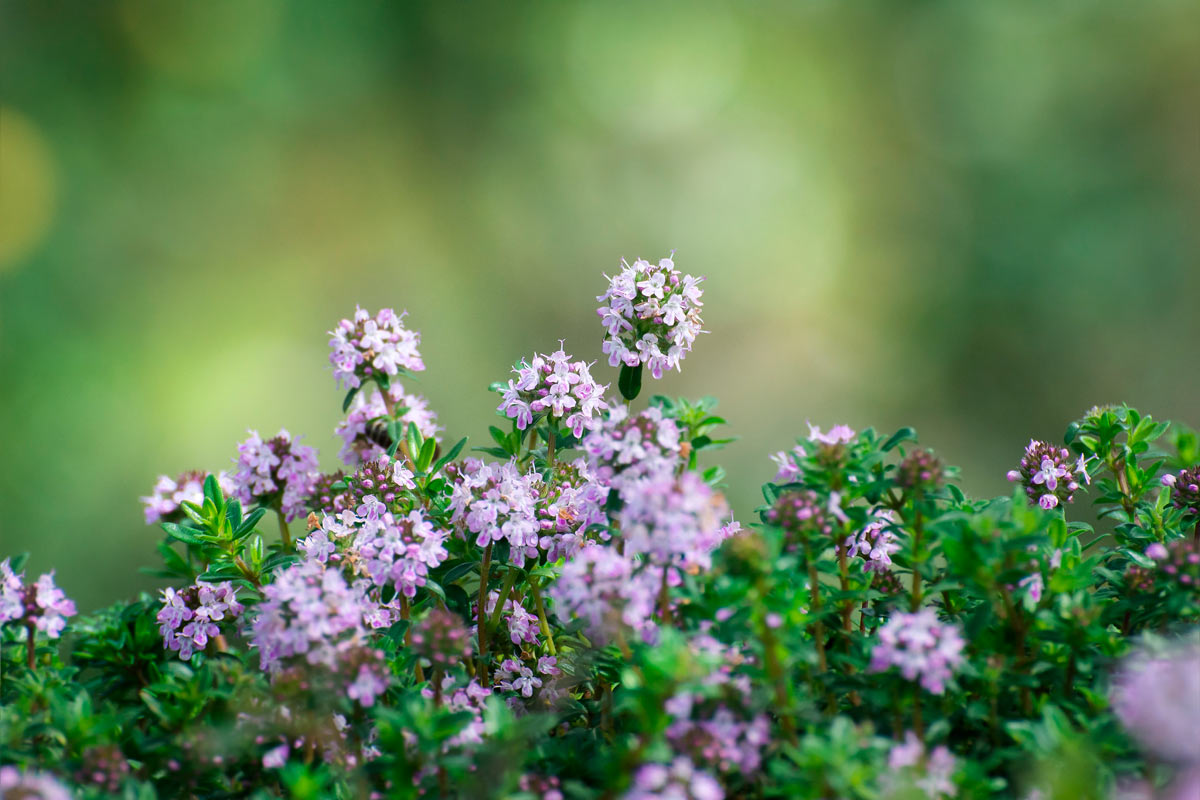Thyme, Thymus vulgaris, properties and uses
2 years ago · Updated 8 months ago

The thymus thyme is a plant that stands out in both the culinary and medicinal worlds. Known scientifically as Thymus vulgaris, this aromatic plant is an essential ingredient in Mediterranean gastronomy and a valuable resource in traditional medicine.
What is thyme, Thymus vulgaris?
Thyme, or Thymus vulgaris, is a perennial herb belonging to the Lamiaceae family. Its use dates back to ancient civilizations, and its presence ranges from the Americas to Asia, passing through Africa and the heart of the Mediterranean. This plant is distinguished by its resistance and its easy adaptation to different ecosystems.
In addition to its contribution to a variety of dishes, thyme plays a leading role in the preparation of essential oils. Its penetrating aroma and characteristic flavor are unmistakable and have been appreciated throughout history.
One of the reasons why thyme is so highly valued lies in its chemical composition, full of flavonoids and other substances beneficial to health. It is precisely this composition that gives thyme much of its medicinal properties.
Types of thyme
Thyme is typical of temperate climates and native to the countries of the western Mediterranean basin. It grows on dry and sunny soils and resists well to frost and drought in marine and mountainous regions. It presents a great diversification in subspecies and the Iberian Peninsula is one of the richest areas in terms of species and with more endemisms.
It is an aromatic plant. Its generic name comes from the Greek verb Thym, which means <<perfuming>> in allusion to its intense and pleasant aroma. The specific name refers to its frequent presence. It is a small, woody, evergreen, perennial shrub that does not exceed 40 centimeters in height, very branched and compact.
It is a Eurasian genus composed of about 50 species and numerous varieties. Other species found are Thymus hyemalis Thymus capitatus, Thymus mastichina, Thymus serpyllum (with numerous varieties, known as serpol) Thymus piperella and Thymus zygis (grown in Spain and Portugal).
Medicinal properties of thyme
Thyme is known for its positive effects on the digestive system, acting as a powerful antiseptic and promoting the vitality of the organism. Thanks to its components, it is an ally in the treatment of respiratory disorders, as it exerts an expectorant and anti-inflammatory action.
- Antispasmodic: Helps to relieve muscle spasms
- Expectorant: Promotes the expulsion of mucus from the respiratory tract.
- Anti-inflammatory: Reduces inflammation and pain in various conditions.
- Antiseptic: Combats and prevents bacterial and fungal infections.
The fundamental role of thyme in traditional medicine is due to its versatility and effectiveness in treating multiple ailments, without the side effects of conventional drugs.
Benefits of thyme tea
The thyme tea is an infusion that concentrates many of the virtues of this plant. It is recommended to facilitate digestion, soothe cough, and as a natural remedy for insomnia problems.
To prepare the tea, it is advisable to use both fresh and dried leaves. It brings almost immediate relief in cases of throat infections thanks to its antimicrobial properties.
In addition, thyme tea can be a great ally during cold or flu season, strengthening the immune system and helping to relieve symptoms of respiratory diseases.
Culinary uses of thyme
In cooking, thyme is an essential seasoning in Mediterranean cuisine. Its intense flavor and aroma make it ideal for marinating meats, flavoring oils and vinegars, and in the preparation of stews and soups.
- It provides a unique flavor to grilled meats and stews.
- It is also used in the preparation of stews and soups.
- It is used in the preparation of sauces and dressings.
- It is perfect for seasoning vegetables and enhancing the taste of salads.
- It goes wonderfully with legumes and is a key ingredient in the preparation of Provençal herbs.
- It is perfect for seasoning vegetables and enhancing the taste of salads.
- It is used in the preparation of sauces and dressings.
The versatility of thyme in the kitchen is immense, and its ability to complement and enhance flavors makes it a must in any pantry.
How to grow thyme at home
Growing thyme at home is a rewarding and accessible activity. This plant requires little attention and is ideal for those looking to get started in herb gardening.
Thyme prefers direct sunlight and well-drained soil. It is drought resistant, so it does not require frequent watering. Regular pruning encourages its growth and prevents it from becoming woody.
In addition to providing a steady supply of this herb for the kitchen, growing thyme helps create an aromatic and attractive nook in any outdoor space or window.
You may be interested in these other wild plants:
Thyme contraindications and precautions
.
Although thyme is beneficial in many ways, like any medicinal plant, it has its contraindications. Caution is advised in people with known allergies to herbs of the Lamiaceae family.
Excessive consumption may cause adverse reactions such as gastrointestinal disorders. It is also important to note that thyme essential oil should be used with caution, given its high concentration of active compounds.

Pregnant or nursing women and young children should consult a health care professional before using thyme for medicinal purposes.
For wild plant and mycology enthusiasts, our online store offers a wide selection of related products. From cultivation tools to specialized guides, it's the perfect place to explore the world of herbs and mushrooms.
To discover more about this fascinating plant, here's a video demonstrating how to grow thyme at home.
In short, tomillo is much more than an aromatic herb for the kitchen. Its medicinal properties and health benefits make it an essential element for overall wellness.
Let's always remember the importance of responsible harvesting and respect for nature when enjoying its gifts. And for fans of mushrooms and wild plants, La Casa de las Setas offers everything you need to delve into this interesting hobby.
See you in the bush!

Te pueden interesar